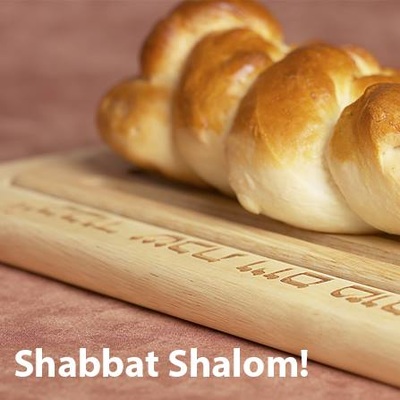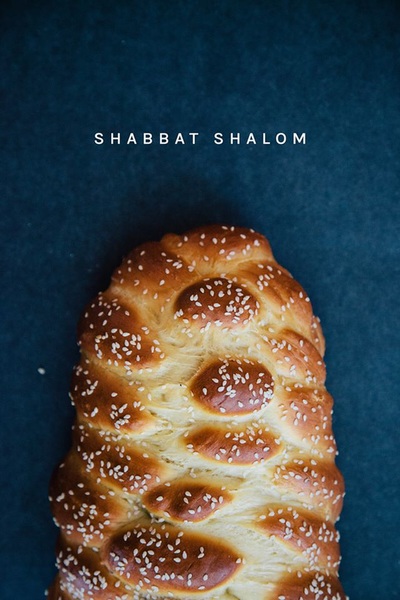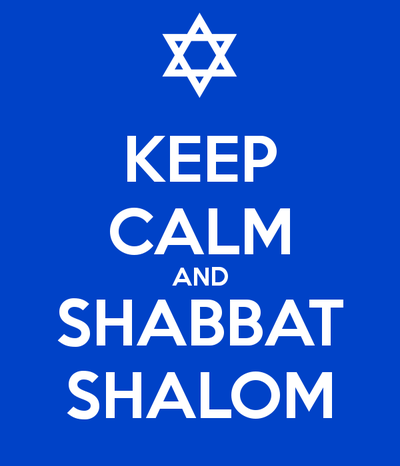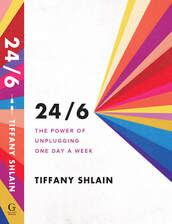.וביום השביעי שבת וינפש...
On the seventh day God ceased from work and was refreshed.
- Exodus 31:17
- Exodus 31:17
This page is meant to be a resource to help us think a little differently about how we approach Shabbat - personally, professionally and communally. Whether it's a Shabbat dinner with your friends or you're planning a program/experience at work, take some time to focus on new practice, refresh ritual and enhance the meaning of your Shabbat.

From food to rest to activities, we are conditioned to function through scheduled time at a very early age. Jewish ritual and practice also often has a seder (order) in how it plays out in our lives. But in the connected, fast-paced and ever-structured state that we know as our daily schedule, how do we make time, create space and fill some of those spots with a little more kavanah (intention) and possibly a little less keva (structure)?

The Torah spaces it out for us. Genesis 2:3 informs that God blessed the seventh day and sanctified it, but we only are reminded in Exodus 20:8 to zachor (remember) the Sabbath day to keep it holy. It is much later that we are instructed to shamor (observe) the Sabbath day to keep it holy. (Deuteronomy 5:12). Why? Maybe it's because they are separate mitzvot. Or, perhaps, to remind us every once in a while (in different chapters - read: in different ways at different times throughout our lives) that we need to slow things down and return to home base.
Creating Space & Time
Welcoming Shabbat (Kabbalat Shabbat) is one of the ritual innovations of the circle of Kabbalists (Jewish mystics) who gathered around Rabbi Isaac Luria in sixteenth-century Safed in the Land of Israel. - Mishkan T'filah: A Reform Siddur
Abraham Joshua Heschel's The Sabbath has been known as one of the classic sources of Jewish spirituality since it was originally published in 1951. Heschel introduces us to the concept of an "architecture of holiness" that appears not in space but in time, and argues that Judaism is a religion of time: it finds meaning not in space and the material things that fill it but in time and the eternity that imbues it, so that "the Sabbaths are our great cathedrals." With these concepts combined with poetry, we are encouraged to find greater meaning in our actions and how they create and impact the space we exist and engage in. E18teen and Kol B'Seder joined together to put some of Heschel's words to music. Check it out >>
The way we create this space and time in our lives may vary on where we are along our Jewish journey, what our work-life balance presently looks like and how we look to carve out time in our busy schedules to reflect, recharge and renew. Whether it's thinking about how you can/want to observe and celebrate Shabbat or you're looking for something new for your Shabbat service or dinner table, there are some great websites out there in the interwebs to help you along your journey...
How do you prepare for Shabbat? From baking challot to engaging in community service or acts of tzedakah to meditating, we all have our rituals. Think about how you schedule time BEFORE Shabbat to prepare for your experience. It might sound funny, but think of Shabbat through the lens of sports. Just like athletes, there are certain things that we must make time for pre-game and post-game. Those actions/rituals are sometimes just as important as what their responsibilities are during the game. The same is true about Shabbat. Our (emotional, spiritual and physical) preparation has an impact on how we are experience Shabbat.
|
|
|
Connecting To Our Texts
Looking to add media content to your Shabbat experience? Thinking about different ways to include personal connection and/or thematic threads in your t'filot? Interested in creating your own prayer sheet/packet or siddur? These are a few of the many user-friendly websites that will connect you with templates, apps, videos, text source sheets and much, much more!
Choosing Your Playlists
|
Music can play a large role in the way we create space and time, as well as connect to liturgy and ritual. Both ancient and modern texts, blessings and prayers create a soundtrack that connects tradition with modern practice.
While many songs are available for purchase or streaming, here are a few links to Jewish music online storefronts and streaming services. |
|
Children AND Families
Shabbat can be a very special time of the week for children, and an opportunity to introduce meaningful ritual and practice into your weekly routine. There are a variety of specific resources that have been developed for families and children to help include Shabbat along their Jewish journeys.
Social Justice & Tikkun Olam
Our task of repairing the world doesn't have to completely take a break during Shabbat, as there are a number of ways to incorporate social justice in our Shabbat rituals.
Social Media
Whether you're posting on your personal or professional social media channels, what message(s) are you sending before, during, and/or after Shabbat? What images can you connect with your post?
Think about using Shabbat as an opportunity to:
Think about using Shabbat as an opportunity to:
- send a personal greeting;
- recap some of the highlights of the past week;
- engage readers for upcoming events;
- share a few thoughts on the weekly parashah;
- inform people that you'll be taking a break from email/social media to celebrate Shabbat with family, friends and/or your constituents.
|
|
|
|
Unplugging from Technology
We are connected. Our lives are filled with updates, notifications, alerts, reminders and a variety of sounds and vibrations that are used to signal that we have incoming communication from someone or something that is asking for our attention. What if, for a day, we were able to shut out all of that additional noise from our lives. How would we be able to function without our phone in our hand or pocket? How would we be able to communicate with others? How can we suggest/incorporate these concepts into our communal programming with youth, teens and families?
As we prepare, kindle, remember, observe, bless, eat, celebrate and separate the holy from the ordinary, may we find new connection, relevance and fulfillment through incorporating Shabbat into our lives. Have a resource that you like and think should be included on this page? Let me know >>
* originally created as part of my coursework in Jewish education, 2013.


































